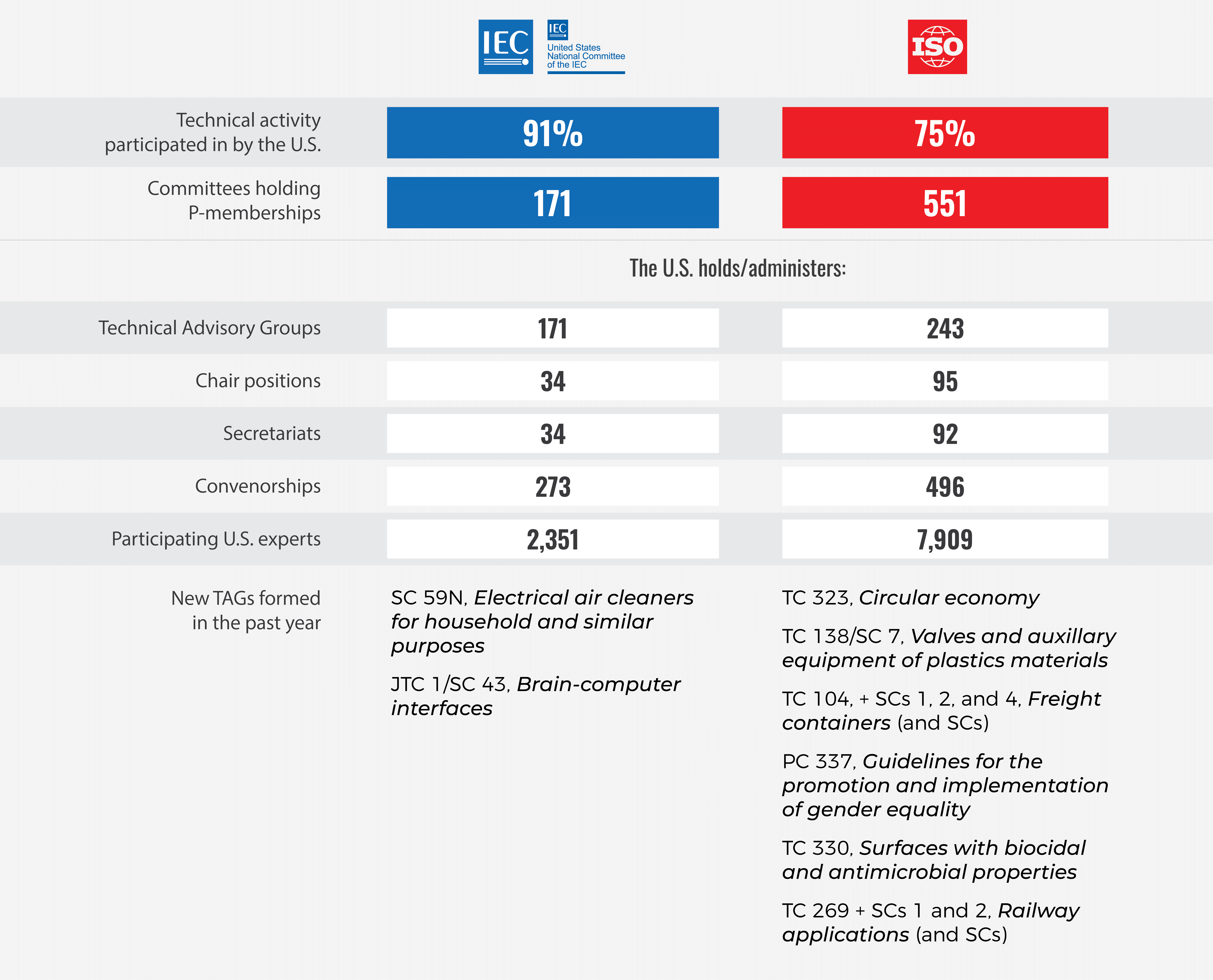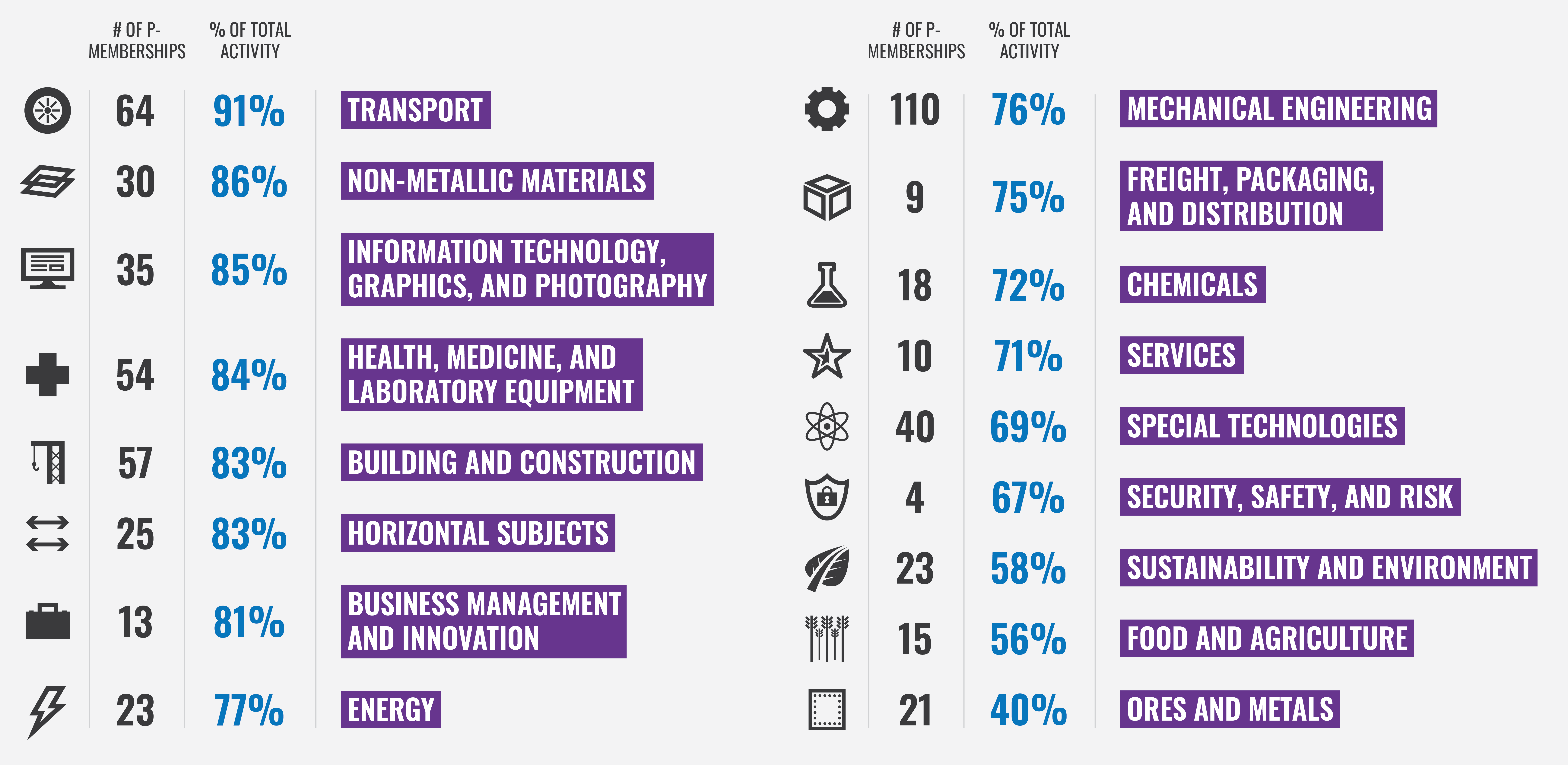With increased high-level attention focused on standardization's importance, ANSI is driving awareness, engagement, and support for the effective and flexible U.S. system, positioned for even greater future impact.
Testifying at a House Committee hearing on the importance of standards to innovation and competitiveness, ANSI vice president of government relations and public policy Mary Saunders shared recommendations for further enhancing robust U.S. leadership and influence in international standardization—particularly in emerging technologies.
Read full written testimony.
In a keynote at the Department of Defense Standardization Program Office (DSPO) 2022 Conference, ANSI president and CEO Joe Bhatia provided an update on ANSI's collaborative standardization activities driving cutting-edge technologies, plus a high-level look at the standardization landscape today and how to best leverage it for tomorrow.
ANSI'S CURRENT STANDARDS COORDINATION ACTIVITIES:
In response to the 2022 release of a European Standards Strategy (ESS), ANSI is leading outreach and monitoring activities as the ESS is implemented: We hosted a listening session for our members and U.S. government officials to share thoughts on the potential implications to U.S. stakeholders. The International Policy Advisory Group coordinated a response to a government request for input from U.S. companies on early experiences with the ESS implementation. And ANSI is leveraging relationships with the European Standards Organizations and U.S. government officials, engaging with US-EU Trade and Technology Council standards and global trade working groups, and conducting outreach to reinforce messaging on the strengths of the U.S. strategy.
Understanding the standardization system can be tricky for newcomers. A new FAQ page on ANSI.org provides clear and concise answers to frequently asked questions about ANSI, standards, and the U.S. and international systems, with links to detailed information throughout our sites. Click below to explore this new resource, which we'll continually enhance based on your feedback.
In other news, ANSI and the Atlantic Council collaborated on a set of engaging op-ed pieces stressing the importance of a coordinated approach to standards for U.S. competitiveness and innovation:
Looking ahead, ANSI will continually develop and promote messaging—guided by our Board effort on the Evolving Standards Landscape—that makes a strong case for standards to the public and decision makers across sectors. Of note, we're initiating plans for an expected revamp of the Standards Boost Business website—a valuable resource for making the case for strategic standardization, due for an update and modernization to make it more relevant, engaging, and impactful.
As international standardization activities continually expand in scope and participants globally, ANSI and our partners are working strategically to bolster U.S. influence, drive leadership and innovation, and share our expertise around the world.
The U.S. is among the most active members of the International Organization for Standardization (ISO) and the International Electrotechnical Commission (IEC), with ANSI and its U.S. National Committee, respectively, representing our nation and cultivating leadership positions in these forums. With continually increasing numbers of international standardization activities and diverse participants, it's critical that U.S. interests double-down on our engagement, support, and leadership to maintain and expand on the impressive ISO and IEC activity levels you see in the tabs below.



The U.S. National Committee of the IEC (USNC, a committee of ANSI) is hosting the IEC 2022 General Meeting October 31–November 4 in San Francisco! This major international gathering is a prime opportunity for U.S. interests to increase active engagement in IEC standardization and make connections across the electrotechnology sector. And the USNC's hosting reaffirms our nation's commitment to international standardization, U.S. leadership in electrotechnical markets, and the impact and importance of standards and conformity assessment, as technologies evolve faster and farther than ever.

When it comes to international trade, standards that are globally relevant, transparent, and consensus-based become solutions, not obstacles. And through our international development partnerships, ANSI is bringing hands-on knowledge to a growing number of countries across the world. The Standards Alliance Phase 2, a partnership between ANSI and the U.S. Agency for International Development (USAID), is one activity with both a tremendous track record and expansive future vision in assisting developing countries in building capacity in legal and regulatory framework and standards and conformity assessment infrastructure.
Below, see all the regions where ANSI is working in partnership with developing countries and U.S. and international public- and private-sector partners.

A hot topic at ANSI Member Forum meetings in 2022 was the widely recognized need for increased capacity building of U.S. standardization participants through more effective and available education and training. And with ongoing attention from government and other stakeholders, ANSI has prioritized this goal with guidance from our Board Focus Groups on the Evolving Standardization Landscape. Following the Focus Groups' analysis and recommendations, the Institute has begun the work of improving and expanding our training courses for domestic and international standardization participants, and developing broader, more effective, and user-friendly educational resources for our entire community. And beyond our own offerings, ANSI maintains a directory of standardization-community-wide educational resources. Stay tuned for more improvements ahead.
Many standards developers and U.S. stakeholders have identified funding as a common challenge to increasing consumer engagement in standardization—while recognizing the importance of consumers' voices.
In response, ANSI launched a Consumer Participation Fund, with the support of five founding sponsors from our membership community, that reimburses consumers for eligible expenses related to the development of American National Standards. In its pilot year, the program has already reached its funding goal and begun accepting applications from eligible consumer participants—with much more to come.
Among ANSI's key roles in safeguarding the integrity of the U.S. system is accrediting standards developers and approving their documents as American National Standards (ANS) when they meet a set of due process requirements. This supports flexibility, responsiveness, and capacity (reflected in the numbers below) by capitalizing on the expertise of thousands of contributors across many developers, while creating assurances for an open, consensus-based process.

Providing a new venue for getting involved in electrotechnology standardization, the USNC Young and Emerging Professionals (YEP) Program was officially launched at ANSI's Spring 2022 World Standards Week. In a highly interactive hybrid session, attendees worked together to shape the future of the program, brainstorming ideas and sharing experiences as newcomers to IEC standardization work with the support of seasoned USNC leaders.
The USNC Professional Mentoring Program has also kicked off its first full year, with nine mentor pairings. The program offers the opportunity for emerging standards and conformity assessment professionals to enter into a one-on-one relationship with more experienced members of the U.S. community to promote retention, development, and overall success of new participants.
Through collaborative, future-focused events and activities led by our Member Forums and increased outreach to diverse stakeholder groups, ANSI Membership is working to engage and respond to the needs of an evolving, ever-broadening world of standardization stakeholders across nearly every area of industry and society.
The pandemic has changed the world in incalculable ways. But along with the adversity are unique opportunities to reassess the ways in which we live, work, connect, and innovate. ANSI is providing resources to help the standardization community address challenges and position ourselves for future success.
ANSI’s Organizational Member Forum (OMF) is leading a webinar series on planning and executing hybrid meetings more effectively. The first sessions included lively discussions of shared challenges, strategies, concerns, and experiences as the community adjusts to hybrid meetings as a new normal. Additional sessions are in the works, with potential spotlights on platform pros and cons, voting tools, and conducting breakout sessions.
Click and watch the first two sessions below.
ANSI launched a practicable resources webpage to help members and organizations throughout the standardization community adapt to new ways of working, strengthen operations, and emerge even stronger. Click below to explore the informative presentations, usable guidance, and other free tools, reports, and need-to-know data.
Standards and conformity assessment solutions have played critical roles in pandemic response. Explore examples of this impactful work from ANSI and its broad community of partners below.
Nations have struggled to increase access to medical devices for prevention and treatment of COVID-19—including rapid diagnostic test kits, ventilators, and personal protective equipment. This year the Standards Alliance Phase 2 Medical Device Regulatory Conversion (MDRC) project, implemented by ANSI member AdvaMed, has been working with local associations and government authorities in the nine countries below to deliver training aimed at increasing the transparency and predictability of partner governments’ regulatory ecosystems for medical devices.
ANSI has maintained and evolved a set of web resources as the pandemic enters new phases, highlighting impactful work from our community and providing relevant tools and information.
ANSI regularly publishes summarized updates on work supporting the fight against COVID-19 being done by our members and partners—including research, guidance, standards development activities, and medical and technological advancements.